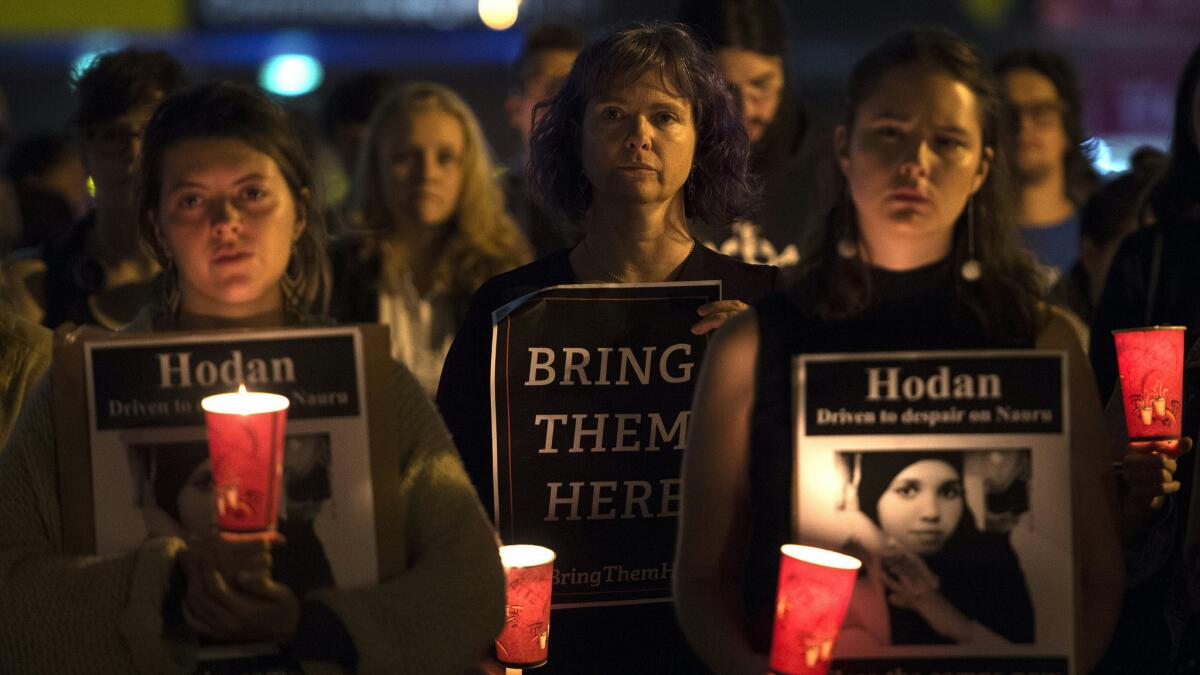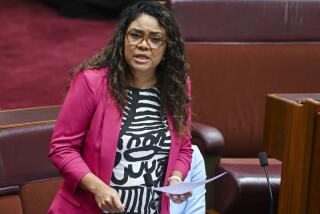Tales of anguish from refugees kept for years in Australia’s offshore camps

- Share via
Reporting from Johannesburg — From inside one of Australia’s secretive offshore camps for refugees and asylum seekers, a young Iranian woman told stories of the desperation surrounding her.
A 5-year-old boy was struck in the face with a stone thrown by a guard. A woman was raped. A girl was forced to swallow laundry detergent. Two refugees set themselves on fire, one burning to death.
“My feeling is numb,” said the Iranian woman, a refugee who arrived in 2013. “We are stuck here and nobody hears us. Nobody cares.”
From her camp on the remote island of Nauru, she communicated with The Times late at night through an encrypted messaging application on a cellphone.
Over the last year, Australia spent $847 million on the offshore detention of around 1,200 refugees and asylum seekers, including dozens of children held indefinitely with no hope of ever calling the country home.
It pays for the camps and associated costs on Nauru, the world’s smallest island state, as well as on Manus Island in Papua New Guinea. More than 80% of the captives have refugee status.
In recent months, they have been allowed to live outside the fenced compounds — as roughly 800 now do, according to the United Nations — but there is no way for them to leave the islands.
The Australian government says its policy of denying legal residence to the migrants deters people from risking their lives on a perilous sea voyage. “If you come to Australia illegally by boat, there is no way you will ever make Australia home,” an Australian army chief warned in a 2014 video aired online and on television in Iran, Afghanistan, Pakistan and Sri Lanka.
But human rights groups, a former detention center director and others who worked in the camps said the policy and the deplorable conditions in the camps were harming some of the world’s most vulnerable people.
Anna Neistat, an Amnesty International human rights researcher who has reported extensively from repressive countries and war zones, said she was shocked by the secrecy, cruelty and relentless annihilation of hope and dignity.
“I have never seen anything like what Australia managed to achieve in this policy,” she said. “This level of cover-up is really stunning. The thing that made this situation so difficult to process is that this is not a war zone. It’s not a repressive regime cracking down on political opponents. These are people who fled some of the worst violence elsewhere, yet these abuses are happening to them.”
An investigation by Amnesty and Human Rights Watch published last week found that Australia purposefully inflicted suffering on refugees and asylum seekers “in what appears to be a deliberate policy to deter further asylum seekers from arriving in the country by boat.”
In May, the U.N. High Commission for Refugees said that prolonged detention on the islands was “immensely harmful” and called for refugees and asylum seekers to be moved and treated humanely.
The first refugee to set himself on fire, a 23-year-old Iranian named Omid Masoumali, did so on April 27 in the presence of U.N. officials. Friends recorded video on their cellphones.
“We are tired of this, we are tired,” Masoumali shouts in the video. “You torment us too much. What more should we do? We are desperate. For three years, you are harassing us. I swear to God. Three years. You ruined our lives.”
Then he sets himself alight, spinning as the flames engulf him.
Video taken hours later shows him pacing in Nauru’s basic hospital, screaming in pain.
Eventually Masoumali was flown to a hospital in Brisbane. But that was after more than 26 hours, according to a friend’s wife speaking on video. He was already unconscious. He died April 29.
Three days later, Hodan Yasin, a 21-year-old Somali refugee, set herself on fire and suffered critical injuries. She was flown to Brisbane and survived.
Australia’s immigration minister, Peter Dutton, acknowledged to a Sydney radio station Thursday that refugees were harming themselves. “Some people have even gone to the extent of self-harming and people have self-immolated in an effort to get to Australia,” he said.
But he also accused some refugees of making false accusations in recent comments to the media and said that both major political parties in Australia supported the “offshore solution.”
Greg Lake, a former director of the Nauru camp and a similar facility on Christmas Island, has been highly critical of the policy and the camp conditions.
“The policy of deterrence is all about constructing an environment that’s worse than the thing people are fleeing from,” he told the Australian Christian newspaper Eternity in June. “So you have to make the situation for people in detention somehow worse than Syria under [Islamic State] is.”
“If you take away people’s hope, what do they have left but things like self-harm?” he said.
Last year Australia made it a criminal offense punishable by two years in jail for an “entrusted person” — such as a doctor, teacher or contractor — to disclose abuses at its two offshore camps. Aid workers and contractors were forced to sign confidentiality agreements.
But a group of teachers and medical staff signed an open letter saying they would continue to report abuses. One of those teachers was Tracey Donehue, who worked on Nauru for Save the Children for 18 months until November last year.

A scene from the documentary “Chasing Asylum,” directed by Eva Orner, that explores Australia’s offshore detention policies.
She authored some of the roughly 2,000 reports of abuse that were disclosed by the Guardian newspaper this week. They detailed sexual assault, child abuse and self-harm at the Nauru camp.
In an interview with The Times, Donehue described the camp as a militarized, fenced, prison-like institution. She saw children who had cut or burned themselves in despair.
“A 16-year-old girl in my class sewed her lips together, as did two other students in the school,” she said. “I’d see cuts on my students’ arms, or burns.”
Another 16-year old girl drank bleach, while a 13-year-old would spend part of each day curled in a fetal position and sobbing in the back of Donehue’s classroom. Another was humiliated by being forced to use the toilet in front of a guard.
“I feel like I am drowning in air,” Donehue said a former student told her recently from the camp. “I will never leave here.”
Donehue said she knew of many unreported cases of sexual assault because victims feared their attackers.
The system was “calculated cruelty” and broke her faith in the idea Australia was “essentially a good country,” Donehue said. “I watched souls break, and we were powerless to help in any meaningful way.”
The Iranian refugee who spoke to The Times arrived by sea from Indonesia, a voyage that still gives her nightmares, she said.
“It was a dangerous and dark time in my life,” she said. “It was an old boat and very small boat, and the water pump was broken, but we were lucky because it happened near Christmas Island.”
At first, she was overjoyed to reach Australia, she said. But she has been detained for the last three years in the Nauru Island camp.
“My soul is not alive,” she said. “I’m … broken. My heart.”
She spoke on condition of anonymity because she feared “trouble” from Australian immigration authorities, she said.
“I saw a lot of things and I realized there is not justice here,” she said in halting English. “Some of [the] underage drank washing powder and some have lots of pills and some of them cut their hands. One of the boys was 5 years old.”
“We are tired because of being tired,” she said. “We can’t sleep without sleeping tablet. All have memory problems.”
Though she is now allowed to leave the camp and venture onto the rest of the island, she said, she has rarely done so since being accosted and groped by three men at a bus stop.
“I was scared,” she said. “Because of that I don’t go out too much.”
Twitter: @RobynDixon_LAT
ALSO
To be young, rich and Chinese in America
Plaschke: Hope Solo’s remarks show the Olympics don’t always bring out the best
Warning of election fraud, Trump sparks fear that his backers may intimidate minority voters
More to Read
Sign up for Essential California
The most important California stories and recommendations in your inbox every morning.
You may occasionally receive promotional content from the Los Angeles Times.










